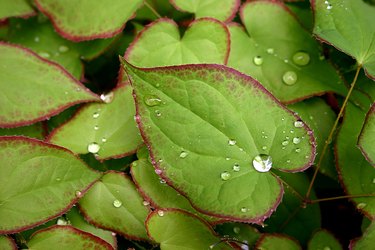
In childhood, the body produces HGH, or human growth hormone, to spur musculoskeletal growth. It produces increasingly more of this growth hormone until peaking when the body experiences its growth spurt in puberty. After puberty, growth hormone levels and production gradually decline, with HGH adopting a lesser biochemical role, helping maintain organ and tissue health. In later years, HGH production declines considerably. This may contribute to decreased bone density and muscle mass, increased body fat and other body changes associated with aging. While scientists debate whether direct HGH supplementation has any measurable effects on signs of aging, many herbalists and sports nutritionists promote the use of herbs that stimulate the body's production of HGH as an alternative approach to combating signs of aging and enhancing body mass, strength and performance. Before trying any of these herbal therapies yourself, discuss your intentions with your doctor to make sure that it's safe for you.
Mucuna
Video of the Day
HGH is produced by the pituitary gland, which is located in the brain. Certain neurotransmitters like dopamine and norepinephrine produced by the hypothalamus gland, also in the brain, promote the pituitary's production and release of HGH. As described in a 2007 review of research in "Clinical Interventions in Aging", an age-related decline in the production of these neurotransmitters may be involved in a similar decline in HGH production. Among the herbal therapies the paper's author, Richard F. Walker, recommends to counteract this age-related hormone insufficiency are mucuna prurien, or velvet bean. It acts in the body as a precursor to dopamine and norepinephrine and promotes their increased production.
Video of the Day
Gingko Biloba
In the same 2007 "Clinical Interventions in Aging" research review, monoamine oxidase (MAO) inhibitors were cited as reducing turnover of the neurotransmitters dopamine and norepinephrine, thereby reducing, delaying or preventing the pituitary's age-related decline in HGH production. Walker lists gingko biloba as one herbal therapy high in these MAO inhibitors. Doctors advise caution in taking any MAO inhibitor if already taking prescribed MAOI anti-depressant medications.
Epimedium
More commonly known as horny goat weed, herba epimedium also has MAO inhibiting effects. One study on the effects of epimedium and four other so-called yang strengthening Chinese herbs with MAO inhibiting properties on the production of certain neurotransmitters in the hypothalamus glands of rats found that all five herbs increased levels of dopamine, norepinephrine and other pituitary-stimulating neurotransmitters. The other yang-strengthening herbs studied that also exhibited MAO inhibiting properties were cinamomi, cortex, herba cistanchis and radix aconiti praeparata.
Other Considerations
Ginseng is a popular Chinese herb promoted for its ability to increase hormone production in men, including HGH. However, a 2002 study in the "Journal of Strength and Conditioning Research" found that ginseng ingestion did not produce any measurable change in anabolic hormone production. Tribulus terrestris, or puncture vine, is also marketed for its benefits in promoting anabolic hormone production, although studies on these claims have yielded inconclusive results to date. The herb chaste tree berry, recommended for relief from PMS symptoms in women, is also used to treat HGH deficiency by normalizing pituitary function, though no studies have yet been conducted to verify this effect.
Warnings
Herbs and supplements can interact with medications and health conditions. You should talk with your health care provider before beginning any regimen to make sure you do not increase your risks for health problems.
- "Clinical Interventions In Aging"; Primary Locus Intervention: A Novel Approach To Treating Age-associated Hormone Insufficiency; Richard F. Walker; Dec 2007
- "Chinese Journal Of Modern Developments In Traditional Medicine"; Effect Of Monoamine Neurotransmitters In The Hypothalamus In A Cortisol-Induced Rat Model Of Yang-Deficiency; M. Chen, et al.; May 1990
- "Journal Of Strength And Conditioning Research"; Effects Of Ginseng Ingestion On Growth Hormone, Testosterone, Cortisol, And Insulin-like Growth Factor 1 Responses To Acute Resistance Exercise"; H. Youl Kang, et al.; May 2002
- "Gale Encyclopedia of Alternative Medicine"; Epimedium; Lisa Frick; 2005
- "Journal Of The International Society Of Sports Nutrition"; Dietary Supplements and Sports Performance: Herbals; Melvin Williams; 2006
- World Anti-Doping Agency: Questions and Answers on Human Growth Hormone (hGH)